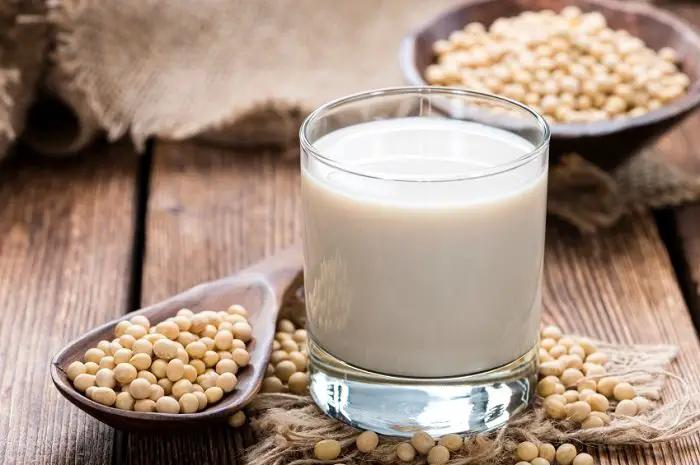
Do you, or someone you know, suffer from lactose intolerance. Do you need to find milk alternatives? Just because you are not allowed to have milk, does not mean you cannot find a milk substitute. In this article, we will look at 5 different milk alternatives for lactose intolerant stomachs, and how you can still enjoy delicious milk alternatives.
What Is Lactose Intolerance?
Before we begin, lets quickly recap on the concept of lactose intolerance. Lactose intolerance is a digestion problem which simply means that a person’s body is unable to digest the sugar in milk. Whilst some people cannot have any milk products, other people may find that only one or two items of dairy, trigger their lactose intolerance.
There is nothing to be ashamed of when it comes to lactose intolerance. In fact, this is quite common and can be treated via substituting milk for alternatives.
If you think you may be lactose intolerant, or experience any of the following signs, you should try swapping out your regular milk for an alternative – just to see if it makes any difference.
Who Usually Suffers From Lactose Intolerance?
Anyone can suffer from lactose intolerance, but those at risk more tend to be new-born babies and adults. Those more at risk include:
- Adults of Caucasian ethnicity are more likely to have lactose intolerance compared to other ethnic minorities
- People who have major stomach or bowel surgery
- People who suffer from coeliac disease
- People who suffer from diarrhea
As you can see, being lactose intolerant is quite common, and there is nothing to be concerned with. All that you need to do is treat these symptoms by cutting out the cause – in this case, milk.
The Signs of Lactose Intolerance
Below we have included a quick list of some of the signs to look out for with regards to lactose intolerance:
- Stomach cramps or stomach pains
- Flatulence
- Bloated stomach
- Feeling sick
- Stomach rumbling
- Diarrhea
Of course, the signs above may only be on a small scale or could be quite severe. If you do experience any of the above symptoms, especially after consuming a dairy product, we recommend that you switch to milk alternatives (or ask a doctor for their advice).
The 5 Milk Alternatives for Lactose Intolerant Stomachs
Okay, so now that we have a good understanding of what lactose intolerance is, and what to look out for, now is the time to look at the 5 best dairy alternatives.
1. Almond Milk
Almond milk is a plant milk which is manufactured from almonds. This still contains that same, creamy texture as regular milk. Almond milk is a popular choice when it comes to lactose intolerance, even veganism. This is a healthy option which is free from cholesterol and lactose.
Almond milk comes in a variety of ways – sweetened, unsweetened, plain, vanilla, and chocolate. There are many options for all of you to try out. You are bound to find one that you enjoy.
2. Soy Milk
This type of milk substitute is made from soybeans and water. Soy milk is a great way for you to get added protein and potassium into your diet.
Again, this is another plant-based milk. There are loads of health benefits when it comes to drinking soy milk:
- Prevents prostate cancer
- Promotes weight loss
- Strengthens blood vessel integrity
- Improve your blood lipid profile
Not only does soy milk benefit those who cannot stomach dairy, it also offers great health benefits.
3. Coconut Milk
Coconut milk is another milk-free product that we regularly see on our shopping market aisles.
Whilst not to be confused with coconut water, coconut milk comes from the meat of a coconut. This substitute still offers a creamy texture. One of the key benefits of drinking coconut milk (which not many people know about) is that it contains triglycerides – a fat that helps to enhance your metabolism which helps with weight loss.
4. Rice Milk
This sounds a bizarre one, but yes, there is actually a thing called rice milk. Rice milk is made from rice grains and is often unsweetened unless you sweeten otherwise.
Rice milk is a popular choice for vegetarians and vegans too because it contains no animal product. It is also a tasty way to try and become healthier.
If you are feeling adventurous, you can even attempt to make your own rice milk!
5. Lactose-Free Milk
Lactose-free milk is exactly the same as the milk you have been drinking (up until now) except for the addition of lactose. Lactose-free milk will prevent your symptoms of lactose intolerance, all the while still feeling like you are drinking your regular milk.
The difference in taste between lactose milk and lactose-free milk is that lactose-free milk tends to taste sweeter.
Below we have outlined a few of the health benefits associated with lactose-free milk:
- Improved digestion
- Good for your bones
- Promotes a healthy heart
- Lactose-free milk tends to taste sweeter (for all of you who like that extra sweet taste!)
Final Thoughts
Whether you have been diagnosed with lactose intolerance, or you think you suffer from signs of lactose intolerance, it is important that you find a substitute quickly.
The longer you wait, the unhealthier you will feel. Finding the right things to eat and drink is important for your body. Your body will reject things that it thinks is harmful to it (which is why you get these symptoms of stomach pains, sickness, and/or diarrhea.
In this article, we have provided lots of different milk substitutes which you can try instead of your regular milk. Of course, not all of these will suit you. You may not like the taste of nutty kinds of milk (almond and coconut), or you may not enjoy the sweetness of other milk substitutes (such as lactose-free milk).
It really is all about trial and error. Finding the right substitute may take a bit of time, but after some time, you will soon start to realize the benefits of swapping your milk.

